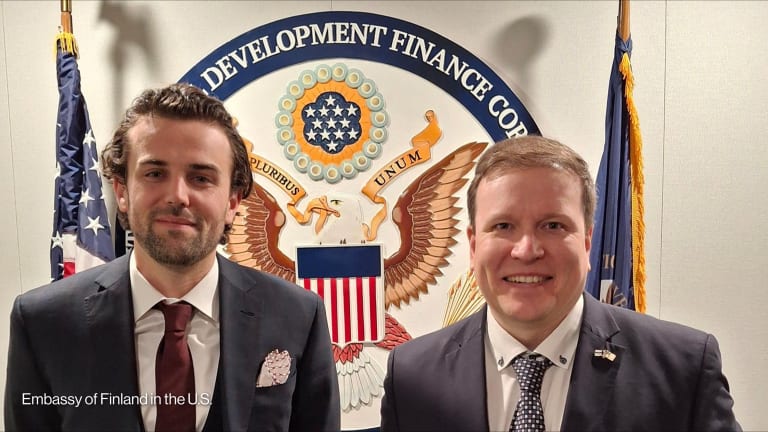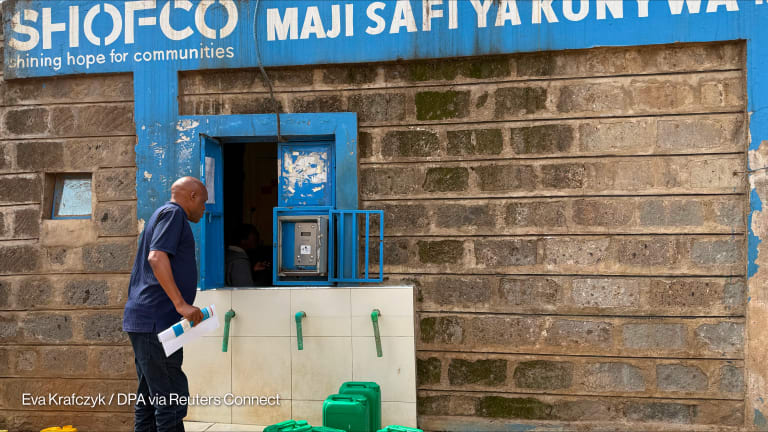Is the aid sector suffering from 'compliance-itis'? One CEO thinks so
By Omar Mohammed // 16 March 2023
The development sector is too cautious these days, James Boomgard believes. The 40-year development veteran and CEO of DAI — one of the world’s largest development companies, and a top deliverer of U.S. Agency for International Development contracts — says there is limited flexibility on projects and less resources directed towards innovation, in a sector that has grown more politicized. But he took particular aim at “compliance-itis” — a focus on hitting accountability targets over getting results. “Everybody looking to find blame and point fingers and everybody wants to oversight everybody else,” he said. “The development enterprise had to protect itself from that.” He said big donors such as USAID, the Foreign, Commonwealth & Development Office, or the European Union, these days monitor whether money is used as promised, more than whether it achieves development impact. Accountability has become a blunt instrument, he said, which prevents development organizations from innovating. “They're constrained by this much more difficult, contentious, litigious environment that we find ourselves in,” he told Devex. Development wasn’t Boomgard’s first choice as a career. Two years into a Ph.D in Philosophy and Economic Thought at the University of North Carolina, he was growing tired and looking for something new. He found a summer job to create a data inventory of what USAID had done around the world. The job took him to Michigan State University to look into their agricultural development program. What he saw there changed his life forever. “Development done well is a local activity … Good development programs have always been local.” --— James Boomgard, CEO, DAI “I was fascinated by the work that they were doing,” Boomgard said. “I had reached my potential of reading philosophy and other things and I couldn't understand it anymore. And it seemed very interesting to actually go out and find out what was going on.” Boomgard switched his research and took up a studentship at Michigan State. He traveled to Thailand and lived there for nearly two years and worked on surveys about small businesses. It was quite a shift for a young man from the American Midwest who had barely traveled and left the country. More than 40 years later, Boomgard has worked in development for nearly that entire time, almost entirely for DAI. He saw DAI grow to have offices in Europe, Asia, the Middle East, and Africa. A big part of the company’s business is it manages projects and provides expertise on development programs paid for by international donor organizations, Boomgard said. “We are top one or two depending on how you define it in the U.K. market and we're the largest technical assistance provider in the European Union,” he said. “So that's a big part of our business.” Recently the company formed DAI Capital, a unit that works with private businesses to help them invest in emerging markets. “We are looking to try to increase the development impact associated with the large capital flows, private capital flows, in the world,” said Boomgard, who became CEO of DAI in 2009. “This is a newer business for us.” Localization Boomgard got animated about the issue that has dominated the world of development recently — localization. Everywhere people are arguing about what constitutes localization and what is even local when it comes to development. This should not be a debate, he said. “Development done well is a local activity,” he told Devex. “Good development programs have always been local.” The issue has now been politicized, Boomgard said, and in a sense, corrupted by some within the sector who see it as a way to lay a claim on resources. The question for development is how the money is being used for the impact needed. “It's not about whether a Pakistani NGO gets the money or a U.S NGO gets the money. The question is: Who can best do the work?” he said. “Let's have a level playing field on that and make those decisions.” He was puzzled that the development community was even debating the issue. “It's weird that it's become such a big issue and the fact that anybody ever believed that good development wasn't local means that they didn't know much about development,” Boomgard said. Diversity Like a lot of American organizations following the murder of George Floyd, a black man who was killed by a white police officer in the U.S. city of Minneapolis, DAI and Boomgard committed to “improve racial inclusiveness within the company.” Asked how the company is working to improve diversity within its ranks, Boomgard told Devex the company’s diversity is reflected in its 13 corporate offices around the world. DAI’s Nigerian office has 42 corporate employees who are all Nigerian, he said. In Pakistan all its 19 corporate staff are Pakistani. About 40% of DAI’s projects are run by advisors who are based in the countries where the programs are being executed, Boomgard said. “If we're going to be successful as a company, we've got to be diverse,” he told Devex. “The U.S. and the U.K. and major Western European countries do not have a monopoly on talent, many of the best and brightest that we've got working on our assignments are from the countries in which we're working.” Boomgard also talked about the model of “inclusive capitalism” that the company has institutionalized, an approach that opens up the ownership of the organization to all its employees. Nobody owns more than seven or eight percent of DAI, he said, and everyone can buy equity into the company. This has allowed its global employees to have a stake in the company financially and culturally. “It's a big deal and that creates a glue, a fabric to the company, that no matter how dispersed we are, how geographically spread out, how diverse we are with religion or race or ethnicity … We all hold one thing and this is we are all one DAI and we all own a piece of that organization,” Boomgard said.
The development sector is too cautious these days, James Boomgard believes.
The 40-year development veteran and CEO of DAI — one of the world’s largest development companies, and a top deliverer of U.S. Agency for International Development contracts — says there is limited flexibility on projects and less resources directed towards innovation, in a sector that has grown more politicized.
But he took particular aim at “compliance-itis” — a focus on hitting accountability targets over getting results.
This story is forDevex Promembers
Unlock this story now with a 15-day free trial of Devex Pro.
With a Devex Pro subscription you'll get access to deeper analysis and exclusive insights from our reporters and analysts.
Start my free trialRequest a group subscriptionAlready a user? Sign in
Printing articles to share with others is a breach of our terms and conditions and copyright policy. Please use the sharing options on the left side of the article. Devex Pro members may share up to 10 articles per month using the Pro share tool ( ).
Search for articles
Most Read
- 1
- 2
- 3
- 4
- 5








